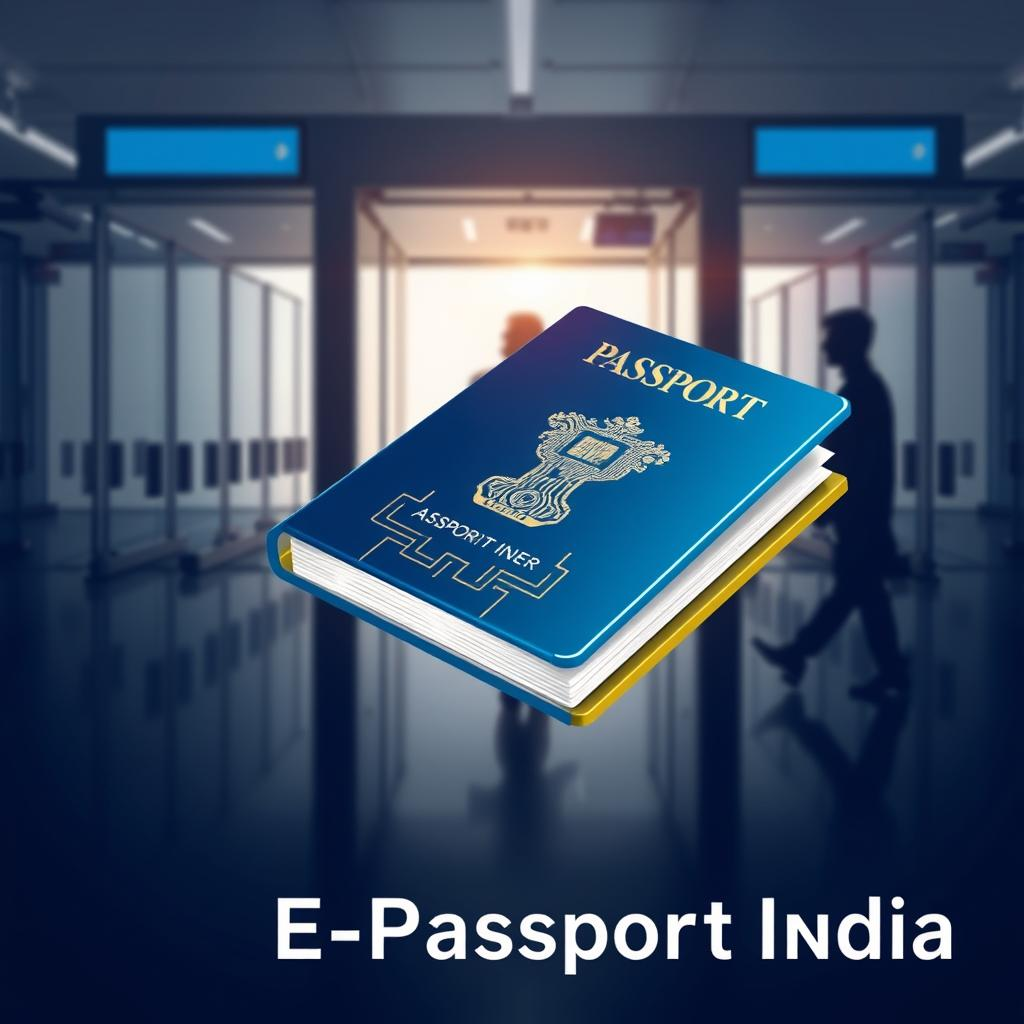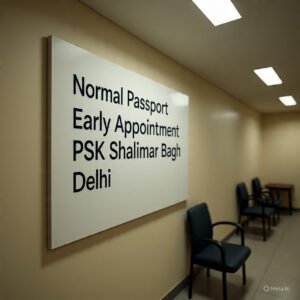Have you ever experienced the frustration of standing in a seemingly endless queue at the immigration counter after a long international flight? The slow, manual process of stamping passports, verifying identities, and navigating through airport security can be a major hurdle for any traveler. But imagine a future where you can simply walk through an automated gate, your identity verified in seconds, and your journey begins seamlessly. This is no longer a futuristic dream; it’s the reality being built with the launch of the e-Passport in India. This revolutionary travel document, equipped with a biometric chip, is set to transform the way Indian citizens travel, offering a new era of security, speed, and convenience.
Table of Contents
What is an E-Passport?
An e-Passport, or an electronic passport, is a traditional passport with an embedded electronic chip.2 This chip, a Radio Frequency Identification (RFID) microchip, is securely integrated into the passport’s back cover.3 The front cover of an e-Passport is easily identifiable by a small, gold-colored biometric passport symbol (a circle with a horizontal rectangle inside) at the bottom.4 The chip stores the same information that is printed on the passport’s data page, including your name, date of birth, passport number, and a digital version of your photograph and signature. Crucially, it also contains biometric data, such as fingerprints, making it virtually impossible to forge or tamper with.
- RFID Chip: The heart of the e-Passport, this chip stores all your personal and biometric information securely.5 It is designed to be read by special e-gates and passport readers at airports, enabling quick, contactless verification.6
- Enhanced Security: The data on the chip is protected by a sophisticated digital signature and encryption based on Public Key Infrastructure (PKI).7 This ensures that the data is authentic and has not been altered since it was issued. This technology is a global standard, compliant with the International Civil Aviation Organization (ICAO) specifications.8
- Biometric Data: Beyond the printed details, the chip holds biometric identifiers like fingerprints and facial data.9 This allows for real-time verification at immigration counters, preventing fraud and impersonation.10
The Ministry of External Affairs (MEA), Government of India, has initiated the phased rollout of these new-age passports as part of the Passport Seva Programme (PSP) 2.0.11 This move is a significant step towards modernizing the country’s passport services and aligning with global travel standards.12
How to Apply for an E-Passport in India
The good news is that the process of applying for an e-Passport in India is largely the same as applying for a traditional passport.13 You do not need to follow a separate or special procedure. The MEA has confirmed that all new and re-issued passports are automatically being converted to e-Passports as part of the nationwide rollout.14
Step-by-Step Application Process
- Online Registration:
- Visit the official Passport Seva portal, the single source for all passport-related services.15
- Click on “New User Registration” and create an account.16 You will need to provide your details and create a unique Login ID and password.
- Once registered, log in to your account.
- Filling the Application Form:
- On your dashboard, click on “Apply for Fresh Passport/Re-issue of Passport.”17
- You can either fill the form online or download the e-Form, fill it offline, and then upload it.18 Filling it online is generally more straightforward.
- Select your application type (Normal or Tatkaal) and passport booklet type (36 or 60 pages).19
- Provide all the required personal details, including your full name, date of birth, address, and family information.20
- Scheduling an Appointment:
- After submitting the form, click on “Pay and Schedule Appointment.”21
- You will be redirected to a payment gateway to pay the required application fee.22
- Upon successful payment, you can select the nearest Passport Seva Kendra (PSK) or Post Office Passport Seva Kendra (POPSK) and book an appointment slot that is convenient for you.23
- Visit the Passport Seva Kendra (PSK):
- Carry the printed copy of your application receipt, along with all original documents and their self-attested photocopies.24
- The documents required include proof of address, proof of date of birth, and an old passport (if re-issuing).25 A comprehensive list of required documents can be found on the Passport Seva website.26
- At the PSK, your documents will be verified, your biometrics (fingerprints and photo) will be captured, and a final verification will be conducted.27
- Passport Dispatch:
- After police verification (if applicable) and final processing, your new e-Passport will be printed and dispatched to your registered address via speed post.28 You can track its status online using the Application Reference Number (ARN).29
Expert Tip: For a hassle-free application process and to ensure all your documents are in order, consider using the services of a professional document services provider. Companies like AM Global based in Delhi, India, specialize in services like passport applications, visa processing, and more. You can contact them directly by calling +91-9999-422-422 or emailing amglobal.org@gmail.com for professional assistance.
Who Can Apply for an E-Passport?
Any Indian citizen who is eligible to apply for a traditional passport can apply for an e-Passport.30 The process is not limited to a select group of travelers.
- Adults: All adult citizens (18 years and above) applying for a fresh passport or re-issuing an old one are eligible to receive an e-Passport.31
- Minors: Minors (under 18 years of age) applying for a new passport are also being issued e-Passports.32 The biometric data collection for minors may have certain considerations, but the core process remains the same.
- Re-issuance: If your current passport is nearing its expiry, is damaged, lost, or you need to make changes to personal particulars, you will receive an e-Passport upon re-issuance.33 There is no need to wait for a separate launch or scheme to upgrade your existing passport.34
It’s important to note that you are not required to replace a valid, traditional passport with an e-Passport.35 Your current passport remains valid until its expiry date.36 The transition is happening naturally as old passports are replaced or new ones are issued.37
Key Benefits of India’s E-Passport
The shift from a traditional paper passport to an electronic one brings a multitude of advantages that enhance both security and the travel experience.38
- Faster and More Efficient Immigration:
- Automated Gates: The embedded chip allows travelers to use automated e-gates at airports equipped with the technology.39 Instead of a manual check, the gate scans the chip and verifies the holder’s identity against the stored biometric data (like fingerprints or facial scans) in seconds.40 This drastically reduces waiting times and eliminates long queues.41
- Reduced Manual Checks: With automated verification, the need for extensive manual checks by immigration officers is minimized, streamlining the entire process.42
- Enhanced Security and Fraud Prevention:
- Tamper-Proof Data: The digital signature on the chip makes it impossible to modify the stored data without detection.43 Any attempt to alter the information on the chip will render it invalid, immediately flagging the document as fraudulent.
- Biometric Verification: The inclusion of biometric data ensures that the passport can only be used by its rightful owner. This powerful feature provides a strong deterrent against identity theft and impersonation.
- Protection Against Counterfeiting: Unlike traditional passports that are susceptible to counterfeiting, the advanced security features of an e-Passport make it extremely difficult to duplicate.44
- Global Recognition and Interoperability:
- ICAO Compliance: India’s e-Passport adheres to the standards set by the International Civil Aviation Organization (ICAO).45 This global compliance ensures that the passport is recognized and accepted at airports and immigration checkpoints worldwide that are equipped with e-Passport readers.46
- Seamless Travel: This standardization facilitates smoother travel and transit across countries, as it reduces the need for manual verification and speeds up passenger processing.47
- Future-Ready Technology:
- The e-Passport lays the foundation for future innovations in travel and border control.48 The technology can be updated and enhanced to incorporate new security features and streamline processes even further. This ensures that India’s travel documents remain at the forefront of global technology.49
- Data Integrity and Storage:
- The chip can store up to 64 kilobytes of data, which is more than enough to hold all the necessary personal and biometric information, along with a digital trail of key events.50 The data stored in an e-Passport is permanent and cannot be deleted.51
| Feature | Regular Passport | E-Passport (Biometric) |
| Physical Appearance | Standard paper booklet with static information. | Paper booklet with an embedded RFID chip. |
| Data Storage | Printed on the paper pages only. | Printed on paper and digitally stored on the chip. |
| Security Level | Basic visual and physical security features. | High-level security with digital signatures and encryption. |
| Verification Method | Manual check by immigration officials. | Automated e-gates and contactless biometric scanning. |
| Fraud Prevention | Susceptible to forgery and tampering. | Extremely difficult to forge or tamper with. |
| Immigration Time | Can lead to long queues and wait times. | Significantly faster processing at e-gates. |
| Symbol on Cover | None. | Small gold, biometric passport symbol. |
FAQ Section
1. Is an e-Passport mandatory for all Indian citizens?
No, it is not mandatory to get an e-Passport immediately.52 Your current traditional passport is valid until its expiry date.53 You will automatically receive an e-Passport when you apply for a new passport or re-issuance.54
2. How much does an e-Passport cost?
The cost of an e-Passport is the same as the cost of a traditional passport.55 The standard application fee for a new or re-issued passport for a 36-page booklet is ₹1,500, and for a 60-page booklet, it is ₹2,000.56 These fees are subject to change, so it’s always best to check the official Passport Seva website for the most current fee structure.
3. Can the e-Passport chip be tampered with or hacked?
The RFID chip is highly secure. It uses advanced encryption techniques and a digital signature (PKI) to prevent unauthorized access and tampering. Any attempt to modify the data on the chip will be instantly detected.57 Furthermore, the chip can only be read by authorized readers at a close range, ensuring data privacy.58
4. Do I need to provide any special documents to get an e-Passport?
No, the list of documents required for an e-Passport application is the same as for a traditional passport. You will need standard proofs of identity, address, and date of birth.59 For re-issuance, your old passport is also required.60
5. Can I apply for an e-Passport under the Tatkaal scheme?
Yes, you can apply for an e-Passport under the Tatkaal (urgent) scheme.61 The process and requirements remain the same, including the additional Tatkaal fee.
6. Where are the e-Passports being manufactured in India?
The Indian government has set up a dedicated facility at the India Security Press in Nashik, Maharashtra, to manufacture the biometric e-Passports.62 This ensures that the entire process is conducted securely within the country.
Conclusion: A Leap Forward for Indian Travelers
The introduction of the e-Passport in India is more than just a technological upgrade; it’s a testament to the country’s commitment to modernizing its travel infrastructure and enhancing the security of its citizens.63 By integrating secure, biometric-enabled chips, the new passport not only promises a faster and more convenient immigration process but also provides a powerful shield against forgery and identity theft.64 While the transition will be phased, the benefits are clear and far-reaching, aligning India with global travel standards and making the journey smoother for millions.
As you plan your next international trip, remember that your new e-Passport is your key to a seamless travel experience. If you require any assistance with your passport application, visa services, or flight bookings, consider reaching out to professionals like AM Global. Their expert services can simplify the complex documentation process, allowing you to focus on the excitement of your upcoming journey.
Disclaimer: This article is for informational purposes only. The application process, fees, and requirements are subject to change as per the guidelines of the Ministry of External Affairs, Government of India. Always refer to the official Passport Seva website for the most accurate and up-to-date information.65
Affiliate Disclosure: This article may contain affiliate links to products and services, such as flight booking and hotel reservation platforms. We may earn a commission if you make a purchase or booking through these links at no extra cost to you. These links help support our content creation and allow us to continue providing valuable information. We only recommend services and products we believe are of high quality and relevant to our readers.







